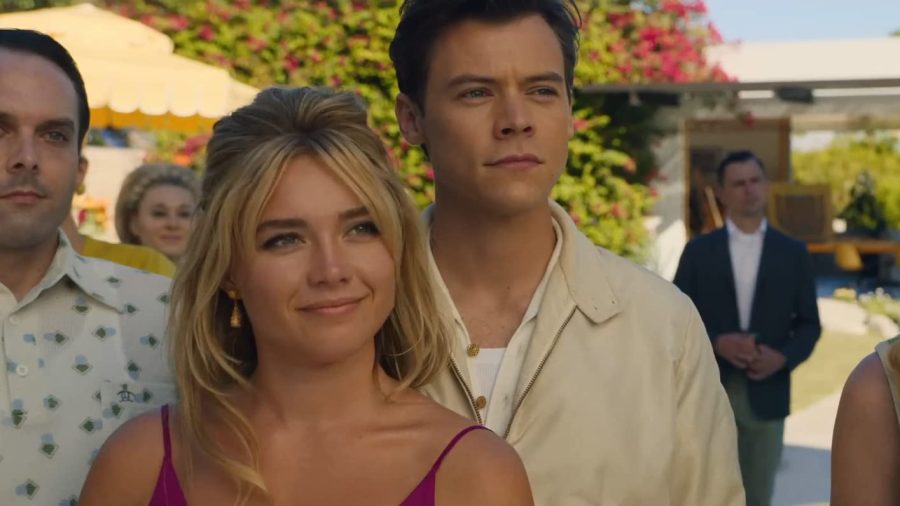‘Don’t Worry Darling:’ I will not be making a pun
Florence Pugh (left) and Harry Styles (right) star in Olivia Wilde’s “Don’t Worry Darling,” in theaters now.
I actually cannot believe that the time has come and I am writing this right now. I remember exactly where I was when it was announced that Harry Styles was cast in Olivia Wilde’s sophomore film “Don’t Worry Darling” over two years ago — my worlds felt like they were colliding.
Wilde’s 2019 directorial debut “Booksmart” is my favorite movie of all time, and consuming anything that Styles puts out is my most dedicated hobby, so you can assume how much this meant to me.
The film centers around Alice (Florence Pugh) and Jack (Harry Styles) as a married couple living in a seemingly idyllic 1950’s community called Victory. All of the men in the community work for the mysterious Victory Project run by Frank (Chris Pine) while all of the women spend their days keeping house — classic 50’s.
However, when cracks appear in Alice’s seemingly perfect life, she begins to question her life in Victory, as well as the Victory Project — suspecting there is something sinister lurking beneath all of the glossy beauty.
Given that this is a psychological thriller, that’s all I can really say about the plot without giving anything away. The twists and turns of this movie reveal such nuanced themes that I do not want to spoil, as they go hand in hand.
But I will leave you with the purposely ominous question: What would you be willing to give up to dismantle the system that serves you?
As I am a permanent resident of Twitter, I had fallen victim to some spoilers prior to seeing the film, partly by accident and partly by succumbing to curiosity (not my finest moment.)
However, I still sat in that theater with my jaw to the floor, which speaks volumes of the movie’s craftsmanship. The delicious cinematography, costumes, locations, throwback soundtrack and unsettling score were so amazing and put you right into the nostalgic past of the 1950’s. It was a push and pull of being so seduced by it yet knowing that something was wrong.
Pugh became Alice, a truly strong and brave heroine, yet still displayed the vulnerabilities that she and all of the women in Victory fell victim to. I also was really taken by Styles’s performance, after recovering from the shock of seeing him on screen — which, when reflecting on the film, was a genius move on Wilde’s part.
I wish I could say more, but you truly need to see this movie for yourself. It’s full of unexpected laughs and shocks and swoons and crawling into the fetal position-worthy moments. However, I will say this:
If you go into this movie writing it off by reductively claiming its only argument is “the 1950s were bad” or “the patriarchy is bad,” and still leave with that conviction, I fear you were the subject of the movie’s critiques.
If stories like this have to be told time and time again, think about why and maybe look at our current political landscape to get some clues. And once you do see the central twist for yourself, you will see how this movie is far more current than can be assumed from a 1950’s style trailer.
And for the people saying, “we get it,” when faced with confronting topics involving feminism or the patriarchy — that’s like if someone yelled ‘we get it!” from the back of the theater during Saoirse Ronan’s famed “Little Women” monologue, so no, you clearly do not get it yet. Keep worrying, darling.
Rating: 5/5







